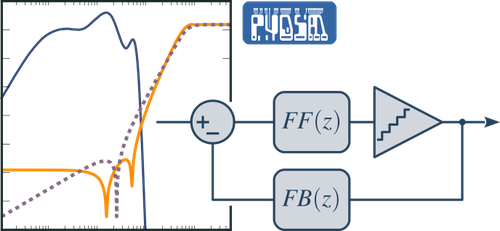Contact Name: Prof. Sergio Callegari
Abstract
ΔΣ modulation is best known for oversampling A/D conversion. However, its most frequent application is as a re-coding approach in the digital realm. Applications range from D/A conversion to “digital” audio amplification, from frequency-synthesis to the storage of analog waveforms in formats that simplify their reconstruction. Working in the numeric domain offers levels of flexibility unknown in analog modulators, enabling the implementation of high-order structures, an accurate tuning of their noise-shaping properties, and a full adaptation to the systems where they are embedded. Yet, this potential is often underemployed by many common design flows. This short course illustrates advanced techniques and optimization methods for the design of the noise shaping properties, which allow them to be tuned to suit specific application needs. Theory is coupled to practical examples ranging from audio coders capable of distributing noise in a psychoacoustically optimal way, to fractional-PLLs, to the more exotic use of ΔΣ modulators as solvers for certain classes of optimization problems. As a bonus, an open source toolbox based on the Python programming language is offered to the participants to experiment with ΔΣ modulators and their noise transfer functions. The toolbox is used throughout the short course to demonstrate the proposed concepts and the course is also an occasion to get introduced to scientific Python.
For further information, please refer to the course synopsis available in the right-top box.
Course registration
Before attending the course, please register on-line.
Course schedule
July 22: 11am-1pm and 2pm-4pm room 5.5
July 23: 11am-1pm and 2pm-4pm room 5.6
About the instructor
Sergio Callegari received a Dr. Eng. degree (with honors) in electronic engineering and a Ph.D. degree in electronic engineering and computer science from the University of Bologna, Italy, in 1996 and 2000, respectively, working on the study of nonlinear circuits and chaotic systems. In 1996, he was a visiting student at King’s College London, UK. He is currently a researcher and assistant professor at the School of Engineering II, University of Bologna, where he teaches “Electronics for analog signal processing” and “Applied Analog Electronics and Sensing” to students of Electronic Engineering and Aerospace Engineering. He is also a faculty member of the Advanced Research Center on Electronic Systems (ARCES) at the University of Bologna.
In 2008, 2009, 2011 he was a visiting researcher at the University of Washington in Seattle for short periods. His current research interests include nonlinear signal processing, internally nonlinear, externally linear networks, chaotic maps, delta-sigma modulation, testing of analog circuits, and random number generation. He has authored or co-authored more than 80 papers in international conferences, journals and scientific books, as well as 4 national patents. In 2004 he was co-recipient of the IEEE Circuit and Systems Society Darlington Award, for the best paper appeared in the IEEE Transactions on Circuits and Systems in the previous biennium.
He is an IEEE Senior Member and he served as an Associate Editor for the IEEE Transactions on Circuits and Systems - Part II during 2006–2007 and as an Associate Editor for the IEEE Transactions on Circuits and Systems - Part I during 2008–2009. He is currently serving as an Associate Editor for the IEICE Nonlinear Theory and its Applications (NOLTA) Journal. For the same journal, he has already served as guest associate editor for a few special issues. He is Secretary of the Technical Committee on Nonlinear Circuits and Systems and also member of the Technical Committee on Education and Outreach in the IEEE CAS Society. He also served in the Organization Committee and as Publication Co-Chair at NOLTA 2006 (Bologna), as a member of the Organization Committee of Eurodoc 2006 (Bologna), as a Special-Session Co-Chair of NOLTA 2010 (Krakow), as a Co-Chair for the Nonlinear Circuits and Systems track at ICECS 2012 and 2013, and as a chair for Nonlinear Circuits and Systems track at ISCAS 2013.
The course has been prepared in collaboration with
Federico Bizzarri, Dipartimento di Elettronica, Informazione e Bioingegneria at Politecnico di Milano, Italy and Advanced Research Center on Electronic Systems for Information and Communication Technologies “E. De Castro” (ARCES) at the University of Bologna, Italy.
Michael Peter Kennedy, Department of Microelectronic Engineering and Tyndall National Institute at University College Cork, Ireland.
